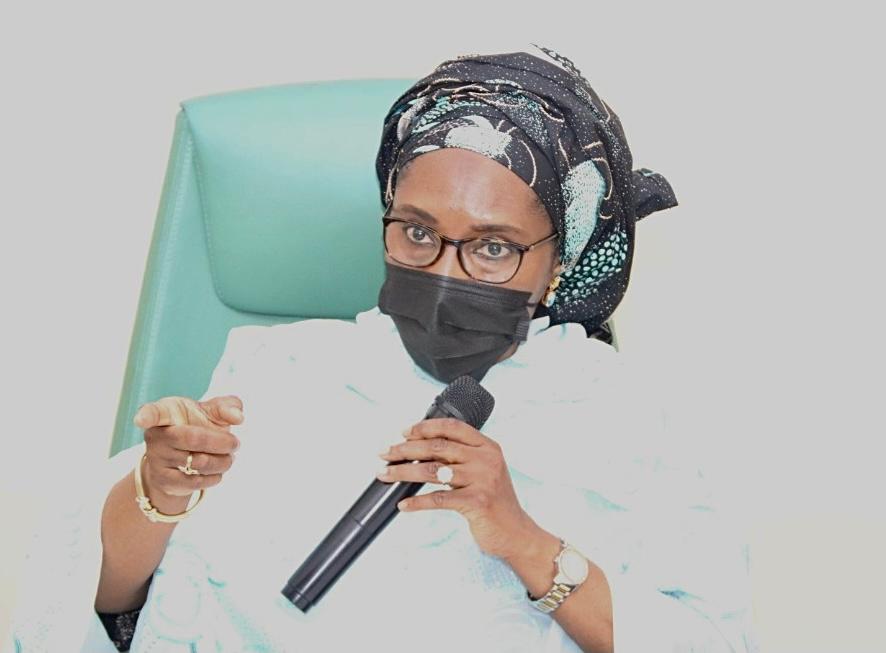Having identified some critical issues for priority attention, the federal government (FG) is committed to diversifying the economy away from external vulnerabilities, focusing on revenue mobilisation, infrastructural development, addressing food security and human development, according to Mrs. Zainab Ahmed, Honourable Minister of Finance, Budget and National Planning.
In her recent chat with Abebe Selassie, International Monetary Fund (IMF) Africa Department Director, Mrs. Ahmed explained that the human development includes social protection, and that the government is determined to explore the transmission mechanisms to change the narrative.
On the overview of the Nigerian economy, she recalled that the country was just recovering from a recession when COVID-19 pandemic came. “It did not only push us back to recession but also reversed most of the development gains recorded in the past decade,” she said.
The setbacks, according to her, required that the government made policy trade-offs to quickly fill the deepening gaps. She noted that, nonetheless, quite a number of the policies were well thought out and decisive steps aimed at building resilience.
Noting further, Mrs. Ahmed said that to mitigate the impact of the pandemic, the government encapsulated the Economic Sustainability Plan (ESP) with the support of our development partners, including the world Bank Group (WBG) last year. “Although the gross domestic product (GDP) recorded a growth rate of 0.11 percent (year-on-year) in the 4th quarter of 2020, in contrast to -3.62 percent in Q3 2020 and 2.55 percent in the corresponding period of 2019 (NBS), and inflation creeping through 17.33 percent, we are a bit encouraged by the recent IMF forecast of 2.5 percent,” she also said.
Speaking on the implication of the trajectories, she explained: “The implication in all of these is that while we may be on the right path, we do believe that with our population growth and demographic trends, only a sustained GDP growth of between seven percent and nine percent will see us through to where we intend to be by lifting up 100 million people out of poverty by 2030.”
Mrs. Ahmed told Selassie that discussions with multilateral institutions such as the IMF could not be thorough without discussing the ongoing COVID-19 vaccination. “The vaccination programme for Nigeria has been progressive and is gradually yielding needed results. As at the time of this meeting, slightly less than a million doses of the vaccine have been administered, representing less than 0.5 percent of the population of the country. We are working assiduously to cover much ground by ensuring that as many as are willing to be vaccinated are promptly attended to,” she said.
In her words: “However, Nigeria like many countries in Africa is concerned about adequate supply. The proper thing may be for producer countries to release their excess stock of vaccines to developing countries that currently have limited or no access. We would appreciate your assistance in that regard. Similarly, multilateral institutions such as the IMF/World Bank are encouraged to continue to pool resources together, particularly the COVAX facility and the African Union (AU) initiative to support local manufacturers in the production of vaccine in Africa.
On debt sustainability, she said that the government is committed to addressing debt sustainability. “We are mindful of our experiences in this regard and the credibility and commitment of President Buhari to transparency and accountability in public expenditure. We take note that our current debt levels are comparatively good, but we are aware of the pressures on debt services and commend the WBG and The Group of Twenty (G20) for the debt service suspension initiative (DSSI).
“However, with current obvious limitations of the DSSI, we may not embrace it, and would prefer to focus on diversifying our economies and enhance efforts at revenues mobilisation and other best practices and would appreciate the understanding and strong support of the IMF in expanding the monitoring and reporting of all public spending, as well as ensuring easy public access to spending data.
“We commend the extension of the DSSI to 2021 as a positive step, but there is need to address the apparent reluctance of the private creditors to participate in the initiative as their participation will ensure a meaningful treatment of debt challenges of countries requesting support under this framework.






